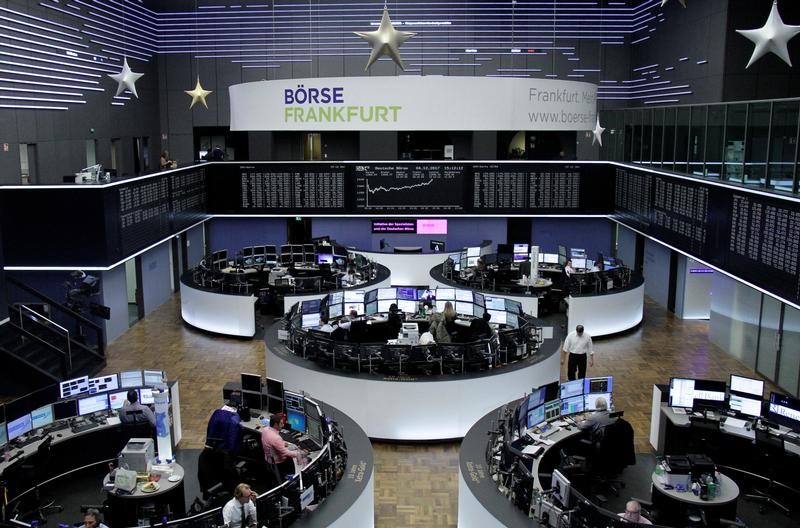By Sujata Rao
LONDON (Reuters) - Investors sold equities on Wednesday and raced to buy Japanese yen and government bonds from the United States and Germany on fears that setbacks to U.S-China trade talks would undermine increasingly fragile-looking world growth.
The yen
World shares (MIWD00000PUS) meanwhile slipped half a percent to a two-week low as weak euro zone data added to negative sentiment following U.S. President Donald Trump's comments on the crucial trade talks.
Investors were also eyeing Turkey and Italy, with the former seemingly headed for a full-blown economic crisis as the Turkish lira
Italian borrowing costs resumed their rise to hit new multi-month highs on fears that an incoming coalition will sharply boost government spending.
The risk-off mood was initially triggered by Trump saying he was not pleased with progress on trade talks with China.
The comments tempered optimism that China and the United States would be able to avert a damaging global trade war. U.S. Treasury Secretary Steven Mnuchin had said at the weekend the "trade war" was "on hold".
Trump also floated plans to fine China's ZTE Corp (SZ:000063) (HK:0763) and cast doubt on a planned June 12 summit with North Korean leader Kim Jong-Un.
Those developments are set to weigh on Wall Street later in the day, with S&P500 and Dow Jones futures down 0.6-0.8 percent (ESc1)
In Asian trading, MSCI's ex-Japan Asian equity benchmark (MIAPJ0000PUS) fell 0.3 percent and Japan's Nikkei (N225) lost 1.2 percent to reach 1-1/2-week lows.
European shares also fell, with one pan-European stock index down 1 percent (STOXX).
"People have realised the risk of trade war remains with us," Swiss wealth manager Prime Partners chief investment officer Francois Savary said.
"Increase in trade was a major reason behind the synchronised global growth and if you blow this up you limit the opportunities for the world economy," he said.
Such worries were underscored by flash Purchasing Managers' Index (PMI) data, which showed on Wednesday that the euro zone economy was slowing more sharply than previously expected.
The data, along with the global sentiment setbacks, sent euro zone bond yields broadly lower, while U.S. Treasury yields slipped to an eight-day low after retreating sharply on Tuesday from near seven-year highs. They are now on the cusp of slipping back under the psychologically significant 3-percent level. (US10YT=RR)
"Italy's political impasse continues, French and German PMIs were soft and global risk sentiment has taken another knock," Societe Generale (PA:SOGN) analysts said.
Prime Partners' Savary was more sanguine on the data, noting that growth, while slowing, remained healthy. But he warned that trade issues alongside geopolitics, especially the reimposition of Iran sanctions, could have economic consequences associated with potentially higher inflation.
Oil prices came off 3-1/2-year highs hit on concerns over supply from Venezuela and Iran. Brent (LCOc1) futures were down 1 percent, inching further from the $80 per barrel milestone.
Lower U.S. yields sapped some of the appetite for the dollar, taking it more than 1 percent lower against the yen
Bond and currency traders worldwide are now waiting for U.S. Federal Reserve minutes from its last meeting, to glean clues on how many more times the central bank might raise interest rates in 2018. The minutes are due later on Wednesday.
Against a basket of currencies, the dollar rose 0.2 percent and the euro (EUR=EBS) bore the brunt with a 0.4-percent loss.
The single currency also fell against another "safe" asset, the Swiss franc (EURCHF=D3), touching a near two-month low.
ITALY, TURKEY
One reason for the euro's woes is Italy, where an incoming coalition government comprised of the two anti-establishment parties - the League and 5-Star - looks likely to implement big-spending policies.
That could add to the country's big debt pile and see Rome clash with the European Union.
Italian bonds fell in value, reversing the modest gains seen on Tuesday and 10-year yields (IT10YT=RR) rose 11 basis points (bps) to a new 14-month high. The premium investors demand to hold Italian debt versus safer German bonds rose sharply to 192 bps. The spread was about 120 bps at the start of May.
Italian stocks tumbled 1.8 percent (FTMIB) and are so far suffering their biggest monthly losses since mid-2016. Investors are watching to see if the eurosceptic Paolo Savona would be appointed to the economy minister position.
"It is a major blow for Europe potentially," Savary said. "As long as (coalition partners) play the game of speaking unwisely, bond yields can go higher."
Elsewhere, emerging markets remained under heavy pressure, with currencies down 0.3-0.6 percent across the board. The selling storm was concentrated on Turkey where the lira
Turkish bond yields have jumped to almost 15 percent, more than 250 bps up from the end of April, with an emergency interest rate rise looking all but certain.
"I doubt (the Turkish central bank) have time to wait until June 7 for the scheduled meeting – the lira is in freefall and concrete steps are urgently required to slow down this quite rapid rate of depreciation," Rabobank analyst Piotr Matys said.

To read Reuters Markets and Finance news, click on https://www.reuters.com/finance/markets